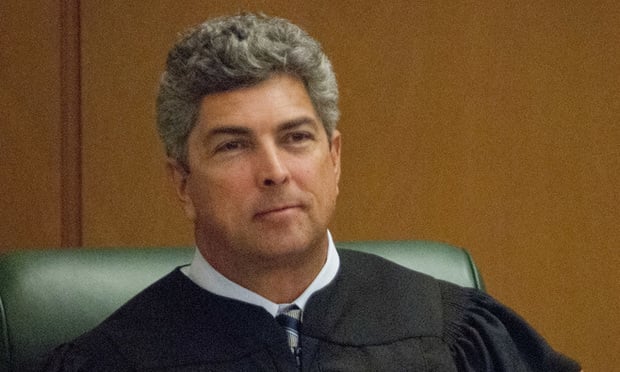Criminal Justice Reform Council Rides Toward Sunset
It's the end of the line for the group that Gov. Nathan Deal picked in 2011 and charged with turning around the alarming increase in prison population and costs in Georgia. The council's term will end even before the governor's in January 2019.
February 16, 2018 at 11:01 AM
6 minute read

The 2018 report of the Georgia Council on Criminal Justice Reform made only a small note of a significant milestone.
It's the end of the line for the group that Gov. Nathan Deal picked in 2011 and charged with turning around the alarming increase in prison population and costs in Georgia. The council's term will end even before the governor's in January 2019.
“Much work remains to be done, but after seven years in business, the Georgia Council on Criminal Justice Reform is scheduled to sunset in July 2018,” the council said in the executive summary of 85-page document that landed Wednesday on the desks of the governor plus Georgia Supreme Court Chief Justice P. Harris Hines and Court of Appeals Chief Judge Stephen Dillard.
The next chapter in the story of the criminal justice reform movement will have to be written largely by the new governor to be elected in November.
“The success of criminal justice reform is evident in a number of ways, from providing a second chance to nonviolent offenders to reducing the recidivism rate and saving taxpayers hundreds of millions of dollars,” Jen Ryan, deputy chief of staff for communications said Friday by email. “Gov. Deal hopes the next administration will continue building upon these successes. The Criminal Justice Reform Council has been integral to the reform process. While the CJR Council sunsets, the governor believes there is great value in having a group of experts vet and produce recommendations. While it will be up to the next administration to determine what form that takes, the CJR Council's role remains invaluable.”
For now, the council still has work to do.
“Before we put down our pencils, we will encourage the adoption of our most recent recommendations, outlined in the pages that follow, and we will urge the creation of new committees to carry on work in several areas. In particular, there is more ground to cover and improvements to be made with our cash bail system, and we hope to have continued dialogue on possible future reforms,” the council said. Legislation to carry out this year's reforms awaits the review of the Senate Judiciary Committee.
“In addition, we believe more attention must be paid to the intersection of mental illness and incarceration,” the executive summary said. “The research is clear: when people with mental health challenges are diverted to effective treatment, recidivism rates decrease. We believe this area deserves a hard look and that evidence-based reforms are needed to reduce the number of people with mental illness behind bars, conserving taxpayer dollars.”
The members of the council also took a look back at the dawn of their service.
“The Governor and General Assembly embarked on reform at a time of great urgency for the state. After two decades of dramatic growth in the prison population, Georgia's annual spending on adult corrections had doubled, from $492 million to more than $1 billion. Despite this substantial investment, the state's 30 percent recidivism rate had remained virtually unchanged for 10 years. Meanwhile, projections called for another wave of prison growth over the next half-decade, along with $264 million more in taxpayer costs. Rather than pour more money into prisons and experience more disappointing results, Governor Deal and legislators changed course,” the council said.
The summary dropped in a quote from Deal in May 2012: “We studied this important issue for a year, met with all the stakeholders, weighed the pros and cons, and delivered a product that passed with total support from both sides of the aisle. That's amazing, particularly on an issue that's so often at the center of partisan divides.”
The results have been of historic proportions, reversing those numbers that so worried the state's leaders back then.
“Reforms enacted to date are improving the effectiveness and fairness of Georgia's criminal justice system and producing benefits for taxpayers as well as offenders and their families,” the council said. “With help from a growing team of dedicated partners across the state, Georgia is creating a criminal justice system that keeps the public safe while ensuring people in prison who are motivated to change receive the support they need to rebuild their lives upon release.”
The council's Exhibit A is the prison population. It did not grow as expected. It declined.
At the end of 2017, the state prison population stood at 52,962—down from a peak of 54,895 in July 2012 and well below the more than 60,000 inmates Georgia had been projected to incarcerate by 2018, absent reform. The jail backlog, meanwhile, dropped from a high of 5,338 people in March of 2009 to 925 people in December 2017. Finally, annual commitments to prison also have fallen substantially, from 21,650 in 2009 to 17,616 in 2017—the lowest number of commitments since 2002,” the report said.
The council turned the numbers around using accountability courts—programs to allow nonviolent offenders to avoid jail with treatment, counseling, community service and staying clean from substance abuse and other legal problems. The state had only a handful before Deal took office.
“At the start of 2018, Georgia had 149 accountability courts operating in all 49 judicial circuits,” the report said.
Another drop-in quote the summary displayed came from Adam Gelb, director of the Pew Charitable Trust's Public Safety Performance Project, which assisted the council in research.
“From a national vantage point, Georgia continues to set a very high bar for other states in both the approach it's taken and the results it's getting,” Gelb said. “What's happening here resonates loudly in capitals across the country where people understand the significance of a large, conservative Southern state making such aggressive and comprehensive reforms.”
The council's sunset reforms target mainly misdemeanor bail and crimes against the elderly.
Recommendations included in the report, unanimously approved by the full council, have been divided into two pieces of legislation and introduced in the Georgia Senate as Senate Bills 406 and 407.
The members of the Criminal Justice Reform Council include: Co-Chair and Georgia Supreme Court Justice Michael Boggs; Senate Majority Leader Bill Cowsert, R-Athens; state Rep. Chuck Efstration, R-Dacula; Northeastern Circuit Superior Court Judge Jason Deal; Clayton County Juvenile Court Judge Steve Teske; Houston Judicial Circuit District Attorney George Hartwig; Oconee County Sheriff Scott Berry; Hall County Solicitor General Stephanie Woodard; Tenth Judicial Circuit District Court Administrator Tracy BeMent; criminal defense attorneys R. David Botts and Roy Copeland; Lookout Mountain Circuit Public Defender David Dunn; Deal's Executive Counsel Carey Miller; Home Depot GC Teresa Roseborough and Clayton Judicial Circuit Public Defender Christine Van Dross.
This content has been archived. It is available through our partners, LexisNexis® and Bloomberg Law.
To view this content, please continue to their sites.
Not a Lexis Subscriber?
Subscribe Now
Not a Bloomberg Law Subscriber?
Subscribe Now
NOT FOR REPRINT
© 2025 ALM Global, LLC, All Rights Reserved. Request academic re-use from www.copyright.com. All other uses, submit a request to [email protected]. For more information visit Asset & Logo Licensing.
You Might Like
View All

Justice 'Weaponization Working Group' Will Examine Officials Who Investigated Trump, US AG Bondi Says


Georgia Justices Urged to Revive Malpractice Suit Against Retired Barnes & Thornburg Atty
4 minute readTrending Stories
- 1DC Circuit Keeps Docs in Judge Newman's Misconduct Proceedings Sealed
- 2Litigators of the Week: US Soccer and MLS Fend Off Claims They Conspired to Scuttle Rival League’s Prospect
- 3Litigator of the Week Runners-Up and Shout-Outs
- 4U.S.- China Trade War: Lawyers and Clients Left 'Relying on the Governments to Sort This Out'
- 5Willkie Adds Five-Lawyer Team From Quinn Emanuel in Germany
Who Got The Work
J. Brugh Lower of Gibbons has entered an appearance for industrial equipment supplier Devco Corporation in a pending trademark infringement lawsuit. The suit, accusing the defendant of selling knock-off Graco products, was filed Dec. 18 in New Jersey District Court by Rivkin Radler on behalf of Graco Inc. and Graco Minnesota. The case, assigned to U.S. District Judge Zahid N. Quraishi, is 3:24-cv-11294, Graco Inc. et al v. Devco Corporation.
Who Got The Work
Rebecca Maller-Stein and Kent A. Yalowitz of Arnold & Porter Kaye Scholer have entered their appearances for Hanaco Venture Capital and its executives, Lior Prosor and David Frankel, in a pending securities lawsuit. The action, filed on Dec. 24 in New York Southern District Court by Zell, Aron & Co. on behalf of Goldeneye Advisors, accuses the defendants of negligently and fraudulently managing the plaintiff's $1 million investment. The case, assigned to U.S. District Judge Vernon S. Broderick, is 1:24-cv-09918, Goldeneye Advisors, LLC v. Hanaco Venture Capital, Ltd. et al.
Who Got The Work
Attorneys from A&O Shearman has stepped in as defense counsel for Toronto-Dominion Bank and other defendants in a pending securities class action. The suit, filed Dec. 11 in New York Southern District Court by Bleichmar Fonti & Auld, accuses the defendants of concealing the bank's 'pervasive' deficiencies in regards to its compliance with the Bank Secrecy Act and the quality of its anti-money laundering controls. The case, assigned to U.S. District Judge Arun Subramanian, is 1:24-cv-09445, Gonzalez v. The Toronto-Dominion Bank et al.
Who Got The Work
Crown Castle International, a Pennsylvania company providing shared communications infrastructure, has turned to Luke D. Wolf of Gordon Rees Scully Mansukhani to fend off a pending breach-of-contract lawsuit. The court action, filed Nov. 25 in Michigan Eastern District Court by Hooper Hathaway PC on behalf of The Town Residences LLC, accuses Crown Castle of failing to transfer approximately $30,000 in utility payments from T-Mobile in breach of a roof-top lease and assignment agreement. The case, assigned to U.S. District Judge Susan K. Declercq, is 2:24-cv-13131, The Town Residences LLC v. T-Mobile US, Inc. et al.
Who Got The Work
Wilfred P. Coronato and Daniel M. Schwartz of McCarter & English have stepped in as defense counsel to Electrolux Home Products Inc. in a pending product liability lawsuit. The court action, filed Nov. 26 in New York Eastern District Court by Poulos Lopiccolo PC and Nagel Rice LLP on behalf of David Stern, alleges that the defendant's refrigerators’ drawers and shelving repeatedly break and fall apart within months after purchase. The case, assigned to U.S. District Judge Joan M. Azrack, is 2:24-cv-08204, Stern v. Electrolux Home Products, Inc.
Featured Firms
Law Offices of Gary Martin Hays & Associates, P.C.
(470) 294-1674
Law Offices of Mark E. Salomone
(857) 444-6468
Smith & Hassler
(713) 739-1250






